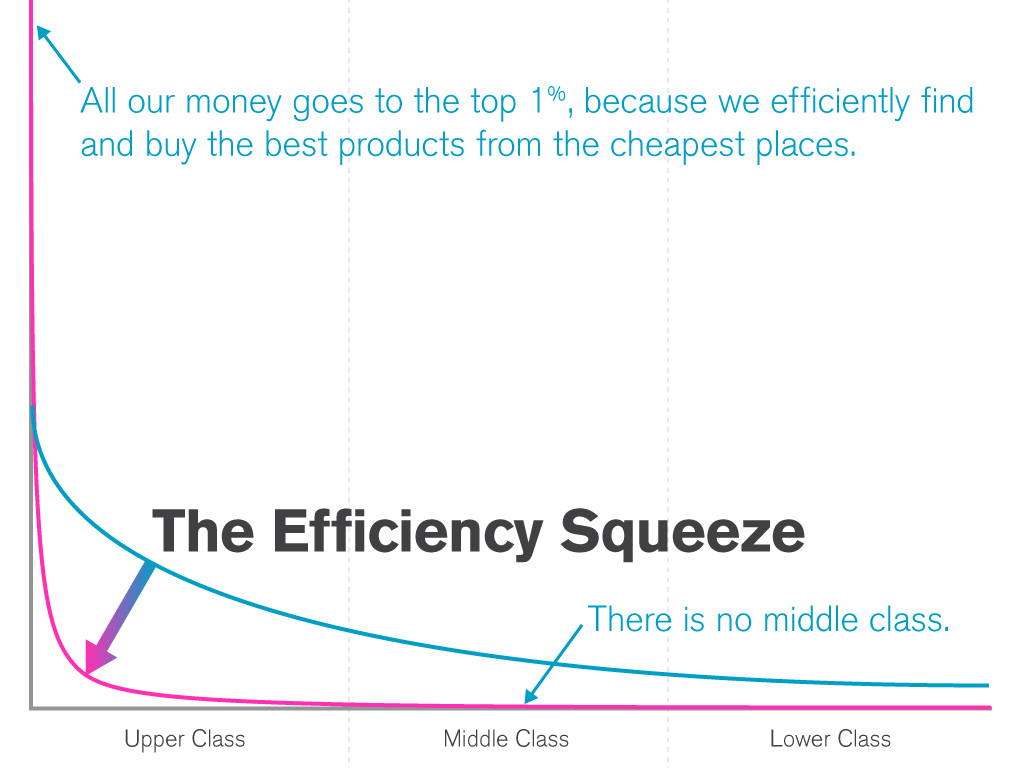Now the Only Job Left in the World Is...
To commoditize everyone else’s job. Let me explain what I mean by that. 99designs.com is a good example. Let’s say, you need a logo designed for your business. You describe what you want, post it on 99designs.com, and a bunch of designers from around the world would design a logo and present it to you. You only pay the winner. It’s a great service. It takes advantage of the fact that somewhere in the world there are always some people who are willing to design a logo for free because it’s fun. But if you are a professional designer, this is bad news. Now your career has been commoditized by 99designs.com. There is less demand for your service, and your fee will come down. Even if you are a high-end designer, this will still affect your business because many other designers will try to climb up the ladder to compete and survive. It brings down the entire market because graphic design as a whole has been commoditized by services like 99designs.com.
This has been happening in just about every market, not just graphic design. Take florists for instance. Now pretty much all the florists have been commoditized by the online services like FTD.com and 1800flowers.com. The creative aspects of being florists have been stripped out of their business, and all they do is to reproduce flower arrangements in the photos supplied by one of these websites, and to fulfill the orders that come in through them. They are essentially running a franchise business, like McDonald’s.
Bookstores are now beyond commoditized; most of them are out of business. You think restaurants are safe? Not really. Many of their customers are now coming in through OpenTable.com. Many restaurant owners hate them because they take a hefty cut from their already thin profit margin. For the lower end restaurants, sites like Seamless.com and Delivery.com do the same thing. Some of these restaurants are now becoming order fulfillment services for these websites. This will only get worse as more people get hooked on the convenience and the efficiency of online ordering.
You think Etsy is great? Yes, if you want to buy crafts for cheap. But if you are trying to make a living doing crafts, Etsy is your enemy. Every time someone comes up with a great idea and posts something beautiful on Etsy, through the brute force of efficiency, a whole bunch of copycats would find your hot idea, make and sell the same thing for much lower prices. This brings down the entire market of handcrafted products because there are always somewhere in the world people who are happy to sell their products at cost, or even at a loss, because it’s fun for them to do crafting.
I could go on and on. Every market is being commoditized in the same manner. So, what do you have to do to survive in this new environment? You need to commoditize your own job before someone else does. Let’s say you are an architect. Don’t practice architecture yourself. Use your domain knowledge to commoditize the market of architects. Whatever career you have, don’t practice it, just commoditize it. That would be the only way to survive in your market. Otherwise, sooner or later, other people will, and you will be working for them at a much lower price. Whoever succeed in commoditizing your market will make all the money, and you would be sharing what’s left of it with the 99% of people in your market.

Now there is much talk about the 1% versus 99%. Before you point your finger at the 1%, think of how you are spending your own money. These days, we are able to find the best products at the lowest possible prices quite easily. Since everyone can do this easily, everyone flocks to the best product, AKA “the top 1%”. And, the top 1% can be anywhere in the world; we can find them and have them shipped. So, if you are using any tools of efficiency to find the best products, the lowest prices, and to save time, you are guilty of creating the income disparity. You might argue that the government should tax the riches, and flatten the income distribution. Well, that would not work. If your government did that, your whole country will become uncompetitive and everyone will lose.
What is now happening globally is sort of like climbing on top of each other in order to escape the hot lava. There is nothing to climb on top of except for each other. The world cannot go on forever in this manner. The brute force of efficiency will soon hit the saturation point where there would be no more inefficiency to exploit. During the golden era of arbitrage, people exploited market inaccuracies to make fortunes. Now, we are applying computer programming to exploit every inefficiency we can find. We are playing musical chairs and the music hasn’t stopped yet.
Subscribe
I will email you when I post a new article.


